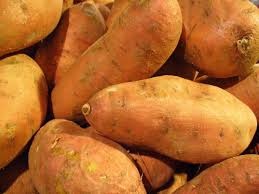GLOBAL IMPACT: FOOD SECURITY, LIFE-SAVING NUTRITION AND ECONOMIC VIABILITY ARE REALIZED THROUGH SMALL-SCALE AND HOUSEHOLD SWEET POTATO FARMING
"Melinda and I believe that helping the poorest small-holder farmers grow more and get it to market is the world's single most powerful lever for reducing hunger and poverty,” proclaimed Bill Gates.
So important to both nutrition and economic viability are sweet potatoes, that they are key part of the U. S. Government's Global Hunger and Food Security Initiative, "Feed The Future.: The nation's global development strategy involves helping poor smallholder farmers worldwide fight malnutrition, food insecurity and poverty through sweet potato farming.
According to this excerpt from the Feed The Future website, there are many reasons sweet potatoes are critical to a global health strategy.
"1. Sweet potatoes deliver life-saving nutrition. While the sweet potato comes in many colors, the orange ones are the most packed with vitamin A. (This can easily cause night blindness and, worse, premature death.) This is particularly important in Sub-Saharan Africa, where more than 43 million children are vitamin-A deficient. Orange-fleshed sweet potato could help them avoid blindness, disease and even death!
2. The sweet potato has been saving lives for years. It has kept millions from starvation in China and Uganda when various crises meant other crops were unavailable to eat. Farmers in Japan and the Philippines have grown sweet potato after typhoons to help aid in food security and recovery.
3. Sweet potatoes can even help fight poverty. Ninety-five percent of sweet potatoes are grown in developing countries, often by small-scale farmers and in home gardens. The extras that families don’t eat, they can sell to boost their income. (Feed the Future just reported that household farmers in Njombe, Tanzania, are earning an average of $600 in extra income from the surplus vegetables in their home gardens. This is a huge impact in communities where incomes are often no more than $1/day or $2/day.) And since many of the orange-fleshed sweet potato varieties are ready to harvest before traditional white varieties, they’re first to market and first to fetch a good price. Women often use the money from selling sweet potatoes to pay for school fees, buy medicines, and purchase other foods for their families.
4. Sweet potatoes are full of the A, B, C’s – and E’s! They’re a valuable source of all these vitamins and even contain some iron and zinc. Just one ice-cream scoop’s worth of orange-fleshed sweet potato (150 grams) meets a child’s full daily need for vitamin A.
5. Sweet potatoes aren’t just for humans – they make great food for animals too. Farmers feeding sweet potato vines to their chickens report that they produce more and better quality eggs. And studies show dairy cows fed with high-protein sweet potato vines produce less methane gas than when fed other feed, potentially helping reduce harmful global emissions. Sweet potatoes also require less water to grow than most grains. So basically, sweet potatoes are climate smart, too!
6. Sweet potatoes are versatile. From Latin America to Africa and Asia to the White House garden, as long as the climate is hot and moist, sweet potatoes will thrive. They can grow anywhere from sea level up to 2,500 meters (higher than the mile-high city of Denver, Colorado). They can also be incorporated into many recipes. In Africa, you can find bread, juices and other snacks made from sweet potatoes. You can even substitute sweet potatoes for a portion of wheat flour when baking to increase nutritional content.
 7. Sweet potatoes are true to their name: They’re sweet, particularly the orange-fleshed varieties. In Africa, children especially love the sweet taste and enjoy snacking on sweet potato and sweet potato products. This helps them get the vitamin A they need to grow up strong and healthy.
7. Sweet potatoes are true to their name: They’re sweet, particularly the orange-fleshed varieties. In Africa, children especially love the sweet taste and enjoy snacking on sweet potato and sweet potato products. This helps them get the vitamin A they need to grow up strong and healthy.
8. Sweet potatoes sweeten fields too! Because they come from a different genus than many other crops, farmers may plant them in between planting other crops to prevent pest build up. George Washington Carver developed this technique, called crop rotation. He was a big fan of sweet potatoes too, creating new uses for them such as flour and vinegar.
9. Sweet potatoes support moms. In Sub-Saharan Africa, we’ve distributed orange-fleshed sweet potatoes to farming communities, particularly to women farmers. Women and children suffer the most from vitamin-A deficiency, so they stand to gain the most from growing them. When we distribute these sweet potatoes to women alongside providing them nutrition education, we can help them improve their vitamin-A status.
10. Sweet potatoes are a stellar example of partnerships and innovation in action...They’re great for moms and children and they’re bad news for poverty, hunger and poor nutrition."
.Bottom photo credit: Tony Kimathi, 2011
